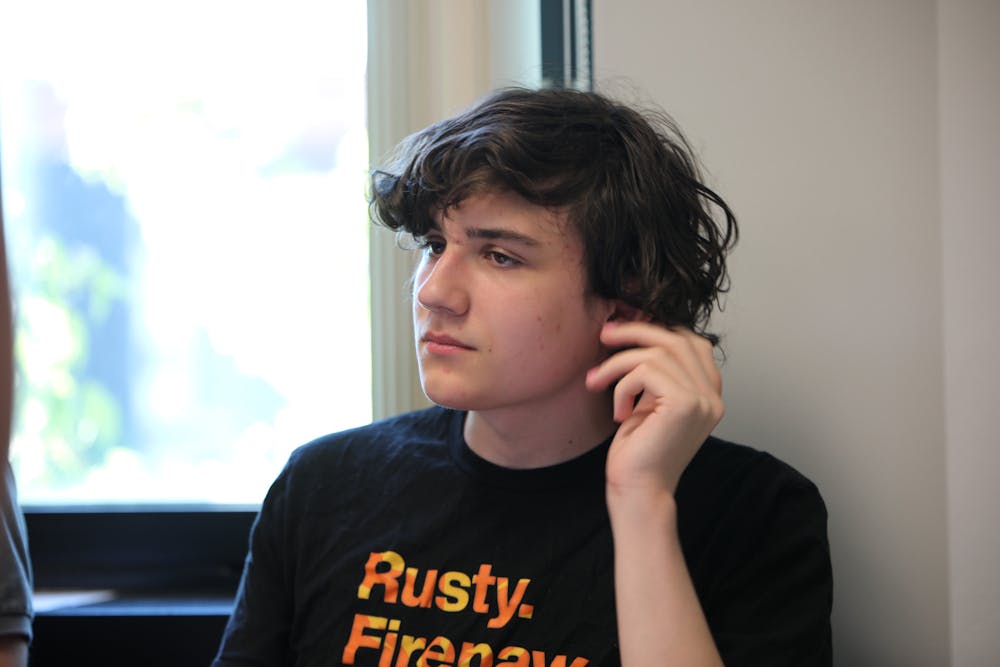UB dropped its Student-Wide Judiciary case against former UB Council student representative candidate Jack Walsh on Tuesday, after student prosecutors failed to find that he violated an election rule prohibiting dishonesty.
Walsh, a freshman computer science major, faced potential sanctions after UB’s Office of Student Engagement accused him of violating section D. 7. A. of part II of the the position’s Election Rules and Regulations, which states that candidates may not “convey false information pertaining to the election, other applicants or themselves in any way, shape or form.”
For this year’s election, UB changed the position’s job description to prohibit candidates from having a platform or promoting advocacy measures. Thomas Vane, the Student Engagement employee in charge of elections, told Walsh that by promoting himself as an advocate, he was misrepresenting the position.
Three University Hearing Representatives — law students with roles similar to prosecutors in UB’s Student-Wide Judiciary — wrote in an email to Walsh that they were “unable to determine that a violation of election rules and regulations section D.7.A. has occurred.”
“This concludes our consideration of the matter, and no sanctions will be assigned,” the email continues.
The rule barring advocacy marks a substantial change in the student representative’s duties. The student representative holds the only elected seat on the UB Council, as required by state education law, and chairs the Council of Advocacy and Leadership (COAL), a coalition of student government leaders.
Previous student representatives have made advocacy the centerpiece of their tenures. Current Student Representative Alika Turton — who was reelected in a three-way race against Walsh and Residence Hall Association president Cameron Kiner this April — ran on improving disability services, bus wait times and meal plans during her initial campaign last year. She made it a point during this year’s campaign to comply with the university’s new rule.
2021-22 Student Representative Brianna Bennett says that when she held the position, advocacy was among her primary duties.
“I’m trying to understand how you partake in the role without engaging in advocacy,” Bennett said in a telephone interview April 27. “I touched on curriculum, buildings — a whole list of things, but it’s still, at the end of the day, speaking on a topic for the population.”
This year’s election was unusually contentious. Walsh claimed the no-advocacy policy was being used to target his campaign, which featured initiatives such as fiscal agent reform, UB Foundation transparency and fighting cutbacks to the College of Arts and Sciences. Turton repeatedly claimed, without providing details or evidence, that she was targeted with “harassing and threats.”
In a statement to the Student-Wide Judiciary, and in interviews with The Spectrum, Walsh said Vane provided him conflicting messages about the alleged rule violations, causing confusion and hampering his ability to campaign.
“I was planning on campaigning quite a bit harder, but I held onto that for a few days, because I was still waiting for results from Student Engagement, who refused to get back to me,” Walsh said in a telephone interview Wednesday morning. “I don’t know if it necessarily cost me the election, but it certainly did not help me at all.”
Walsh says Vane told him during a meeting that his platform violated no rules, but in a subsequent email, Vane cited Walsh’s entire platform as being “in violation” of election rules. Vane did not answer follow-up questions from Walsh before the election ended.
“The whole process seemed like they tried to make a quick change, and it backfired in their faces,” Walsh said. “They tried to change things up at the last second about student advocacy, and then I pushed the boundary, and this gray-zone rule change didn’t really end up holding out that well.”
The Faculty Senate Executive Committee intended to discuss the rule change during its meeting Tuesday, after that body’s Committee on Academic Freedom and Responsibility submitted a memo urging Student Engagement to allow candidates to discuss advocacy.
“It seems clear that the Student Representative serves on the Council in order to represent the concerns of students and advocate that they be addressed,” the memo reads. “It therefore seems obvious that students voting in an election for the Student Representative need to be informed of the issues that each candidate considers most important, so they may choose the candidate whose platform best reflects their priorities for Council action.”
The Executive Committee was unable to discuss the memo after its meeting ran over time.
Walsh says he is curious to see whether the no-advocacy rule will return next year.
“Nice try, administration,” he said. “Nice try.”
Turton and Vane could not be reached for comment.
Sol Hauser is the senior news editor and can be reached at sol.hauser@ubspectrum.com





